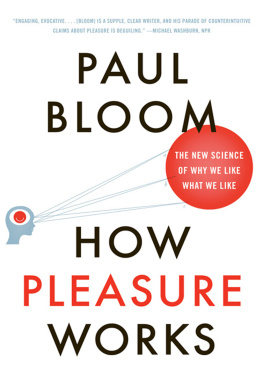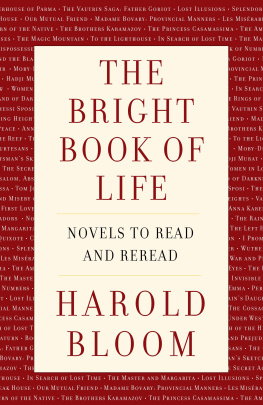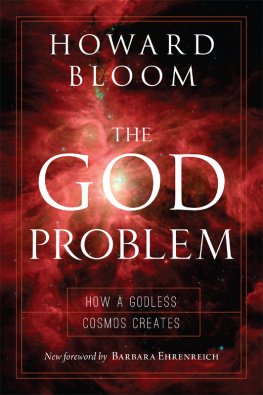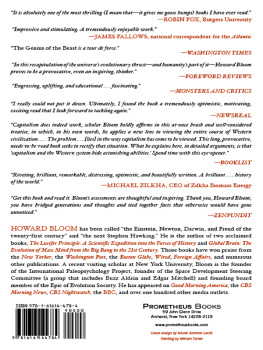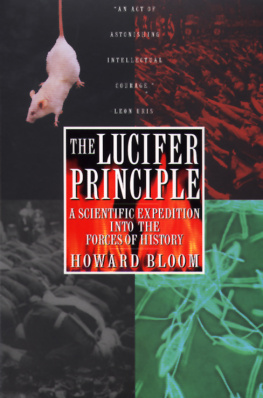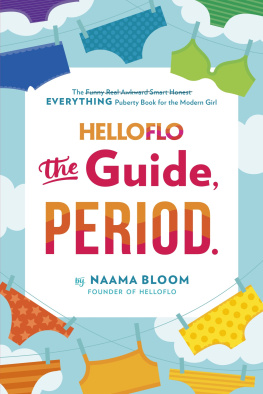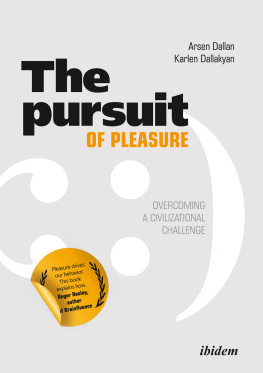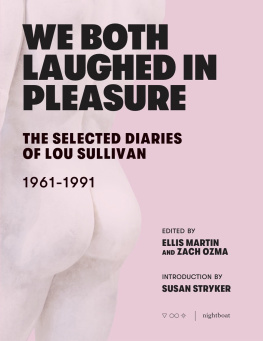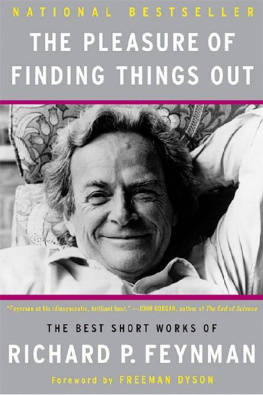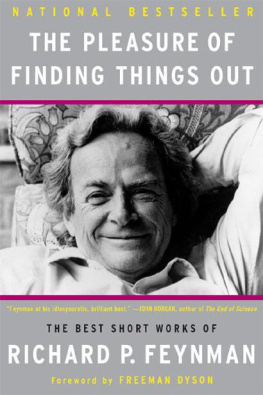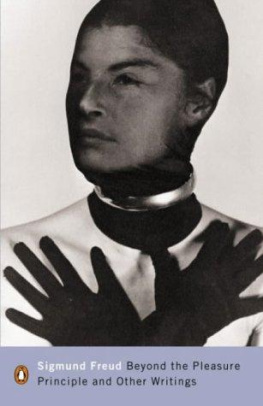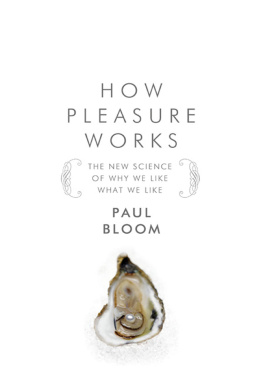Bloom - How pleasure works: the new science of why we like what we like
Here you can read online Bloom - How pleasure works: the new science of why we like what we like full text of the book (entire story) in english for free. Download pdf and epub, get meaning, cover and reviews about this ebook. City: New York, year: 2010, publisher: W. W. Norton & Company, genre: Children. Description of the work, (preface) as well as reviews are available. Best literature library LitArk.com created for fans of good reading and offers a wide selection of genres:
Romance novel
Science fiction
Adventure
Detective
Science
History
Home and family
Prose
Art
Politics
Computer
Non-fiction
Religion
Business
Children
Humor
Choose a favorite category and find really read worthwhile books. Enjoy immersion in the world of imagination, feel the emotions of the characters or learn something new for yourself, make an fascinating discovery.
How pleasure works: the new science of why we like what we like: summary, description and annotation
We offer to read an annotation, description, summary or preface (depends on what the author of the book "How pleasure works: the new science of why we like what we like" wrote himself). If you haven't found the necessary information about the book — write in the comments, we will try to find it.
Bloom: author's other books
Who wrote How pleasure works: the new science of why we like what we like? Find out the surname, the name of the author of the book and a list of all author's works by series.
How pleasure works: the new science of why we like what we like — read online for free the complete book (whole text) full work
Below is the text of the book, divided by pages. System saving the place of the last page read, allows you to conveniently read the book "How pleasure works: the new science of why we like what we like" online for free, without having to search again every time where you left off. Put a bookmark, and you can go to the page where you finished reading at any time.
Font size:
Interval:
Bookmark:
How Children Learn the Meanings of Words
Descartes Baby:
How the Science of Child Development
Explains What Makes Us Human
E DITED OR C OEDITED BY P AUL B LOOM
Language Acquisition: Core Readings
Language and Space
Language, Logic, and Concepts
The New Science of Why We Like What We Like
 W. W. Norton & Company | New York | London
W. W. Norton & Company | New York | London
Copyright 2010 by Paul Bloom
All rights reserved
For information about permission to reproduce selections from this book, write to Permissions, W. W. Norton & Company, Inc., 500 Fifth Avenue, New York, NY 10110
Production manager: Julia Druskin
Library of Congress Cataloging-in-Publication Data
Bloom, Paul, 1963
How pleasure works: the new science of why we like
what we like/Paul Bloom.
p. cm.
Includes bibliographical references.
ISBN: 978-0-393-07711-7
1. Pleasure. I. Title.
BF515.B56 2010
152.4'2dc22
2010005803
W. W. Norton & Company, Inc.
500 Fifth Avenue, New York, N.Y. 10110
www.wwnorton.com
W. W. Norton & Company Ltd.
Castle House, 75/76 Wells Street, London W1T 3QT
For my father, Bernie Bloom
THERE IS AN ANIMAL ASPECT TO HUMAN PLEASURE. WHEN I come back from a run with my dog, I collapse onto the sofa, she onto her dog bed. I drink a glass of cold water, she laps from her bowl, and were both a lot happier.
This book is about more mysterious pleasures. Some teenage girls enjoy cutting themselves with razors; some men pay good money to be spanked by prostitutes. The average American spends over four hours a day watching television. The thought of sex with a virgin is intensely arousing to many men. Abstract art can sell for millions of dollars. Young children enjoy playing with imaginary friends and can be comforted by security blankets. People slow their cars to look at gory accidents, and go to movies that make them cry.
Some of the pleasures that I will discuss are uniquely human, such as art, music, fiction, masochism, and religion. Others, such as food and sex, are not, but I will argue that the pleasure that humans get from these activities is substantially different from that of other creatures.
The main argument here is that pleasure is deep. What matters most is not the world as it appears to our senses. Rather, the enjoyment we get from something derives from what we think that thing is. This is true for intellectual pleasures, such as the appreciation of paintings and stories, and also for pleasures that seem simpler, such as the satisfaction of hunger and lust. For a painting, it matters who the artist was; for a story, it matters whether it is truth or fiction; for a steak, we care about what sort of animal it came from; for sex, we are strongly affected by who we think our sexual partner really is.
This theory of pleasure is an extension of one of the most interesting ideas in the cognitive sciences, which is that people naturally assume that things in the worldincluding other peoplehave invisible essences that make them what they are. Experimental psychologists have argued that this essentialist perspective underlies our understanding of the physical and social worlds, and developmental and cross-cultural psychologists have proposed that it is instinctive and universal. We are natural-born essentialists.
In the first chapter, I introduce the theory of essentialism and argue that it can help explain the mysterious pleasures of everyday life. The next six chapters explore different domains. Chapters 2 and 3 look at food and sex. Chapter 4 is about our attachments to certain everyday objects, including celebrity memorabilia and security blankets. Chapter 5 is about art and other performances. Chapters 6 and 7 are about the pleasures of the imagination. Each of these chapters can be read independently. The final chapter explores some broader implications, and ends with some speculations about the appeal of science and religion.
The plan throughout this book is to understand the nature of pleasure by looking at its developmental origin in individuals and its evolutionary origin in our species. The study of origins is a useful source of insight. As the biologist Darcy Thompson famously put it, Everything is the way it is because it got that way. Still, the very mention of evolution in the context of psychology tends to raise both red flags and red herrings, so some clarification might help. For one thing, evolutionary does not mean adaptationist. Many significant aspects of human psychology are adaptationsthey exist because of the reproductive advantages that they gave to our ancestorsand I discuss some of these throughout this book. But other aspects of the mind are by-products; they are, to use a term introduced by the evolutionary biologists Stephen Jay Gould and Richard Lewontin, spandrels . This is particularly the case for pleasure. Many people enjoy pornography, for instance, but there is no reproductive advantage associated with spending ones days and nights looking at pictures and videos of attractive naked people. The appeal of pornography is an accident: a by-product of an evolved interest in actual naked people. Similarly, the story of the depth of pleasure is, I think, mostly the story of an accident. We have evolved essentialism to help us make sense of the world, but now that we have it, it pushes our desires in directions that have nothing to do with survival and reproduction.
Evolved also does not mean stupid or simple. I recently talked about the pleasures of fiction at a seminar in an English department, and one of the participants told me afterward that he was surprised by my approach. He said that it wasnt as awful as he had thought it would be. He had expected me to present some simpleminded reductionist biological story and was pleased that I spoke instead about the intense interest people have in the mental states of the author, and about the rich and complex intuitions that underlie our enjoyment of stories.
It was nice to make an English professor happy, but embarrassing too. I thought I was presenting a simpleminded reductionist biological story. His comment made me realize that I am defending two claims that dont usually go together: first, that everyday pleasure is deep and transcendent, and, second, that everyday pleasure reflects our evolved human nature. These might seem to clash. If pleasure is deep, you might reason, it must be cultural and learned. If pleasure has evolved, then it should be simple; we should be wired to respond in certain ways to certain stimuli, in a way that is perceptual, low-level, and superficialthat is, stupid.
So I am aware that the claims made in this bookthat pleasure draws upon deep intuitions, that it is smart, and that it is evolved and universal and largely inbornare unusual. Still, I hope to convince you that they are true. I am also going to argue that they really matter. There are serious gaps in the modern science of the mind. The psychologist Paul Rozin points out that if you look through a psychology textbook, you will find little or nothing about sports, art, music, drama, literature, play, and religion. These are central to what makes us human, and we wont understand any of them until we understand pleasure.
EVERYONE HAS something interesting to say about pleasure, and many of the ideas here grew out of discussions with family, friends, students, colleagues, and the occasional stranger on a plane. But I want to mention the influence of seven scholars who have thought deeply about these issues: Denis Dutton, Susan Gelman, Tamar Gendler, Bruce Hood, Geoffrey Miller, Steven Pinker, and especially Paul Rozin. I disagree with each of them in certain regards, but much of this book is a response to their ideas, and Im glad to be able to acknowledge this intellectual debt.
Font size:
Interval:
Bookmark:
Similar books «How pleasure works: the new science of why we like what we like»
Look at similar books to How pleasure works: the new science of why we like what we like. We have selected literature similar in name and meaning in the hope of providing readers with more options to find new, interesting, not yet read works.
Discussion, reviews of the book How pleasure works: the new science of why we like what we like and just readers' own opinions. Leave your comments, write what you think about the work, its meaning or the main characters. Specify what exactly you liked and what you didn't like, and why you think so.

